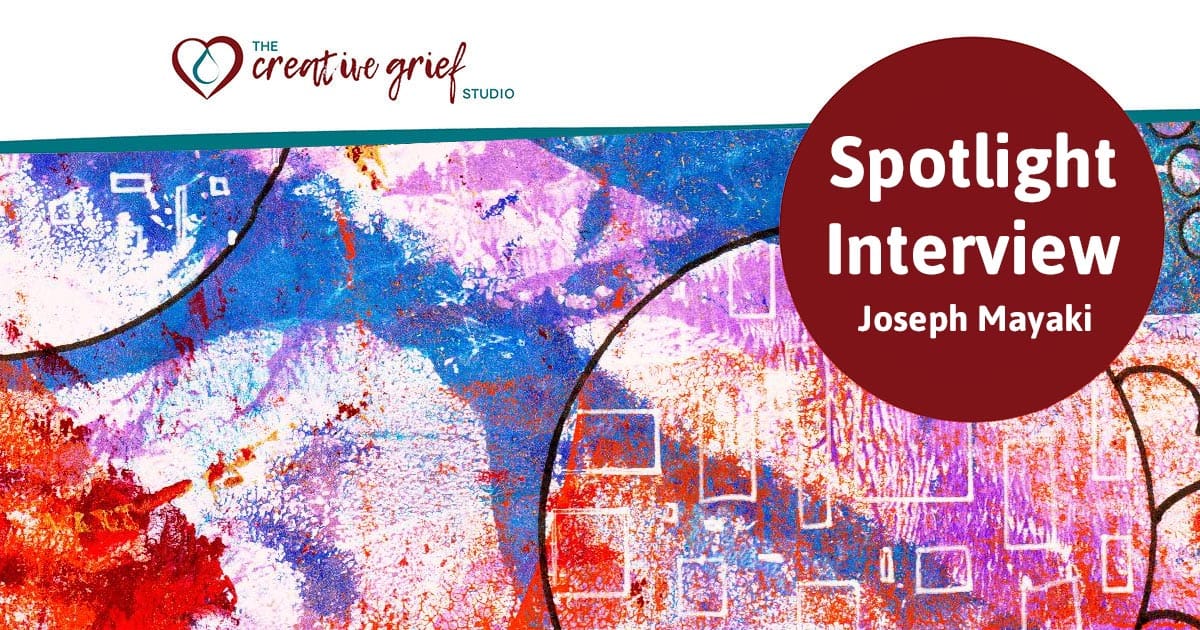Here at The Creative Grief Studio
We have alumni who’ve joined our past classes from Finland, Belgium, United Emirates, Australia, New Zealand, South America, and South Africa. And yet, the majority of our alumni hail from the USA and Canada. Knowing that grief is strongly influenced by the meaning-making in one’s culture and society, we’re always excited to welcome participants from a range of countries around the world. Well, our September 2016 Creative Grief Support Certification class was an extra special one. Not only did we welcome our first Kenyan, but we were also delighted to welcome our first participant from Nigeria in Africa!
Meet Joseph Mayaki
 Joseph Mayaki is an assistant university lecturer and PhD scholar. As you may already be aware, the world of grief psychology has a long history of representing, attracting, and serving predominantly white, middle-class, middle-age women. It’s not escaped us that our own faculty represents that demographic, and is also almost entirely located in the USA (with Cath bringing a little love from South Africa!).
Joseph Mayaki is an assistant university lecturer and PhD scholar. As you may already be aware, the world of grief psychology has a long history of representing, attracting, and serving predominantly white, middle-class, middle-age women. It’s not escaped us that our own faculty represents that demographic, and is also almost entirely located in the USA (with Cath bringing a little love from South Africa!).
We’ve puzzled for a long time over how our studio might contribute to bringing culturally sensitive, anti-oppressive, and helpful grief support to a more diverse group of people, and especially to people who are more likely to be marginalised in multiple ways in society. We have no doubt that an important way to achieve this is by including people who live with the effects of marginalisation, poverty, and oppression. So we were very excited to receive Joseph’s application to join our September 2016 Creative Grief Support Certification class and community.
Joseph is an African scholar who will, no doubt, bring fresh eyes, ears, mind, and heart to research and practice in the world of grief psychology, so we were also pleased to be able to support his vision for pioneering creative grief support in Nigeria by awarding him with a Creative Grief Studio scholarship.
Our conversation with Joseph
Q: Could you tell us a little about the city you live in, and what life is like there – what are some of the things you love most about your city and way of life?
I live in a town called Auch, located in the northern part of Edo State, Nigeria. It is surrounded by beautiful communities such as Jattu, Elele, Iyamho, Iyora, Ayua, Ogbido, Oluoke and Opkella. Auchi is a major commercial centre in Edo North region. I love the peaceful nature of the town and its unique cultural features.
Q: Please tell us about your rich academic and work background that you’re bringing to this class…
I studied English Arts, then proceeded to do a Masters in Literature. I am doing a PhD research on Scriptotherapy, focusing on the therapeutic potency of writing. I have been teaching at primary, secondary, and tertiary levels for more than ten years now. Presently, I am an assistant lecturer in Edo University, Iyamho, Edo State, Nigeria, while being part of a PhD programme at the University of Ibadan, Nigeria, where I also got my previous degrees.
Q: Could you tell us a bit about some of the common ideas about grief, and ways of grieving that people in your city seem to be influenced by?
In my opinion what is common is that many people here relapse into hopelessness and helplessness during grief. This is common among the poor masses. There is a class of the rich in certain cultures here that employ professional mourners who get paid to support them in mourning their loss during grieving moments, but the prevalent condition is toxic grieving, amongst both rich and poor alike, rather than a healthy type.
Q: How is grief support and counselling in general viewed in Nigeria?
In my part of the world, grief support is yet to be popularly explored from a professional perspective. For the majority, it is considered a mere waste of resources to seek support during grief, especially when money would be involved. Most people rely on their religious leaders, and there is a limit to what they can offer. In my part of the world the claims of creative therapies are considered luxurious and unpopular, but I believe in it and I want to be among its pioneers.
Q: Why have you decided to join us in the September class? What does your vision for your future work look like, and how do you hope our training will contribute to your PhD studies and your future work?
I became interested in this programme because of the relationship and resemblance it shares with my research work, which is also in grief and creativity. And then I decided to join this programme because I see it as one of many steps I’m taking in the advancement towards the achievement of my career goal, which is to become a practicing therapist and a renowned scholar within the ambit of the medical humanities.
—
Joseph, a warm welcome to our community, and all the best to you as you further develop your work!

